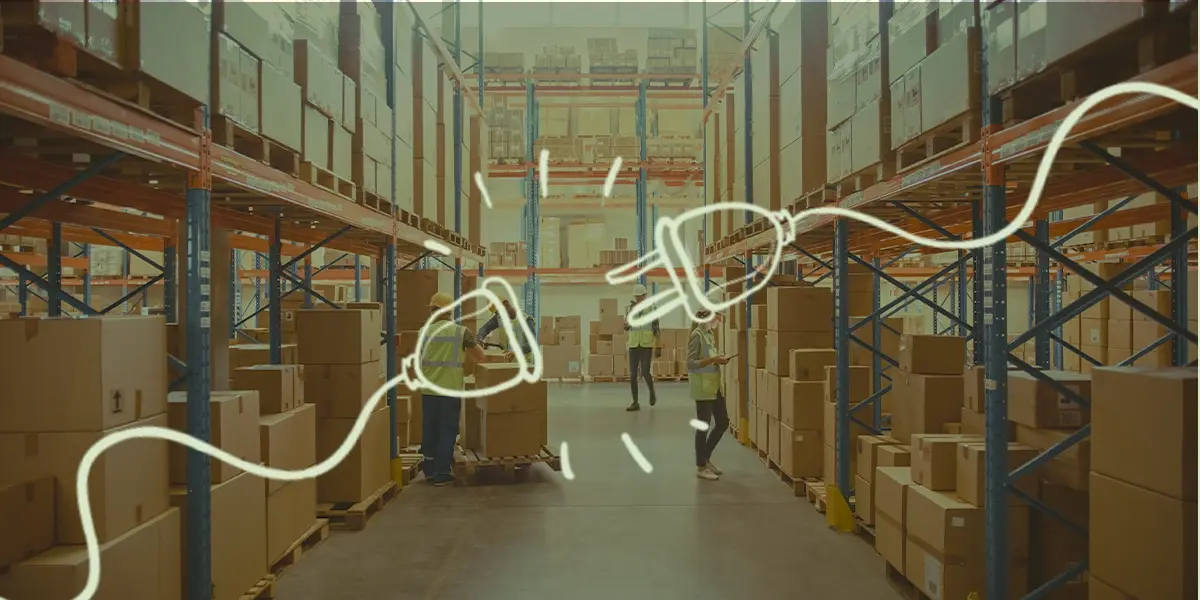Could you, and should you, use a WMS without ERP integration?
In most cases it’s best to integrate the ERP with the WMS, there some exceptions that we will dive into in this article. And to answer this question, we need to view the subject with a wider lens. Beginning with the core objective of any Warehouse Management System (WMS).
WMS systems are built to simplify and increase the efficiency of your warehouse processes. Also, how you measure increased efficiency depends on your industry and company targets - and can vary greatly.
In most well-established companies, an ERP system is already up and running. The ERP helps by collecting, sending, and managing master data, making various business processes smoother and more centralized across the organization. When you integrate the WMS with the ERP, you can avoid potential data silos and cut down on the number of systems your staff need to juggle every day. For instance, customers with high daily order volumes would find it quite challenging to keep up if they had to handle the WMS manually.

Why not always integrate ERP with WMS?
You might now wonder, why not always aim for an integration between your new WMS and the exisiting ERP? Well, there are many scenarios where a standalone WMS makes perfect sense.
A few examples could be:
-
You have a low order volume but with high order values.
-
You run a Legacy ERP that you will replace in a few years, you still want an efficient warehouse operation but avoid spending money integrating to your legacy ERP
-
You are handling the production in one system, finance in another and wants to keep track of your warehouse activities and delivery planning without changing or integrating to other systems.
-
Your company is part of a larger corporation, and it can be a bit challenging to get the HQ IT department's attention..
-
If you're working with a tight budget, it might not be possible e to go for the best-of-breed solution.
In cases like this, we recommend starting without the integration between your WMS and ERP-system, and utilizing a standalone solution.
There are plenty of situations where a standalone WMS is just the right choice. When it fits well, it can really boost the efficiency and effectiveness of your warehouse.
Benefits of a standalone WMS
Opting for a standalone WMS offers a variety of advantages that can significantly impact the efficiency and effectiveness of your warehouse operations.
Some benefits of using a WMS without an ERP integration include:
-
The initial implementation can be less expensive than an integrated solution, making the standalone WMS system a more cost-effective option to start with.
-
Faster implementation, depending on the complexities of an ERP integration.
-
You can quickly take advantage of the easy wins - without adding to your internal IT team's workload.
-
The ability to scale the solution at your own pace, with the option to create an integration later.
Choosing your data transfer path
When it comes to deciding how to transfer your data, it is not a clear-cut choice. You do not have to choose between a standalone WMS or one with ERP integration. There is a middle ground that might suit your needs better.
-
Semi standalone: Sending your warehouse data back to your ERP might be more crucial to make sure the financial transactions are booked automatically. Your IT team might see the integration from the WMS to the ERP financial data as a smaller, more manageable project.
-
E-commerce for order-entry: If you sell B2C via e-commerce then you could import the sales orders from your e-commerce solution first into the WMS, once it is delivered the WMS exports the transaction to the ERP to be invoiced and booked to the finance ledger.
-
PIM for product data: Using a Product information management system for handling product data is often a good solution, in this case you can load this data directly to the WMS as it could contain more information than are available in the ERP, like product pictures.
No matter which path you choose, it is important to select a WMS that you can scale and leverage during your digitization journey.
Bitlog WMS Standalone
 Did you know that you can use Bitlog WMS all by itself without needing to connect it to your ERP? Bitlog WMS standalone is perfect for warehouses that want to take advantage of a flexible WMS but aren't quite ready to integrate it with an ERP or E-commerce platform just yet. Enjoy all the great features without having to integrate with other systems.
Did you know that you can use Bitlog WMS all by itself without needing to connect it to your ERP? Bitlog WMS standalone is perfect for warehouses that want to take advantage of a flexible WMS but aren't quite ready to integrate it with an ERP or E-commerce platform just yet. Enjoy all the great features without having to integrate with other systems.
And when you're ready, or if you need to, you can easily connect Bitlog WMS to your ERP.
You might also like:
-
The five levels of warehouse maturity >
-
5 Tips from Care of Carl: selecting and implementing a WMS >
-
Bitlog WMS Onboarding in 4 Steps [+Infographic] >

Story by
John Ramando

